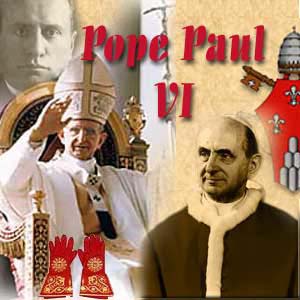
 |
Pope Paul |
| HOME |
 |

Early Career Pope Paul VI was born Giovanni Montini in Italy. He entered the seminary to train to become a priest in 1916 and was ordained a priest in 1920. He studied at the Gregorian University, the University of Rome and the Accademia dei Nobili Ecclesiastici. His organizational skills led him to a career in the curia, a group in the Catholic church consisting of the chief officials of the diocese. These officials assist the bishop in governing the particular church. He also became part of the pope civil service. In 1937 he was named Substitute for Ordinary Affairs under Cardinal Pacelli, the Secretary of State under Pope Pius XI. When Pacelli was elected Pope Pius XI, Montini was confirmed in the position under the new Secretary of State. In 1944 the Secretary of State died, so the role was assumed directly by the pope, with Montini working directly under him. Archbishop of Milan Montini was appointed in 1953 as an Archbishop of Milan. Traditionally the next step for an archbishop in the church would be to be named a cardinal. Many were surprised that he was not named right away. It was later found out that he declined the right to become a cardinal in a secret meeting. Pope Pius revealed that information right before he died in 1958. Though many viewed him as the person who would have succeeded Pope Pius as the next Pope. He could not be named the next pope since he was not a cardinal. Cardinal Angelo Roncalli was elected pope and assumed the name Pope John XXIII. Roncalli almost immediately raised Montini to be a cardinal. Time as Pope In 1963, he was elected by the College of Cardinals to be the next pope. He led the church during most of the big changes during the time after the Second Vatican Council. That council was a group of bishops and clergymen that discussed many political, social, economic, and technical challenges in the church in the 20th century. The bishops and clergymen wanted changes in church structure and practice to address those challenges. Pope Paul VI was no stranger to papacy, the time period when one is a pope. He worked in the church system for many years and had important responsibilities within the church. He also worked directly for Pope Pius XII involved in secretive diplomatic activities during World War II. He was recognized as one of the most important political figures of the period. During his time as pope, he earned the nickname the Pilgrim Pope because he was the most traveled pope in history. He was the first leader of the Roman Catholic Church to visit five continents. Pope Paul VIís has been described as having an inability to make important decisions. His most famous case of indecisiveness revolved around his inability to decide how to deal with the scandalous American Cardinal Cody from Chicago. He was accused of financial and sexual behavior and harsh leadership for years. Pope Paul VI constantly changed his mind over whether or not to remove him. While he wavered, thousands of members of the church in Chicago left the church. There were controversies that surrounded his reputation. One was his involvement in the diplomatic activities through contact with Count Galeazzo Ciano, the Minister of Foreign affairs and son-in-law of Mussolini. Ciano was a follower of Fascism, an extreme political movement under the leadership of Benito Mussolini. That friendship remains an issue of some criticism. Montini worked as a diplomat and has been accused of getting some favors for the Vatican from the Fascists at the beginning of the war in exchange for its support. However, many other historians dispute this analysis. During war-time of WWII, it was said that he received large amounts of money to aid European Jews. At the same time, it was also stated that he was involved in allowing some Nazi leaders escape the fall of the Third Reich. Pope Paul was described as a man of many virtues, but spent most of his time as pope being attacked for all of his decisions. He wrote a letter called Humane Vitae in 1968. It was a letter to the express his views on abortion, birth control, and other issues about human life. The letter remains controversial even within the Church today. The letter had an extremely negative response. As he became increasingly older, Paul spoke of going into retirement, but he remained the pope until his death in 1978. The next pope was Pope John Paul I. Interestingly though, he died in his sleep only 33 days after his election. |
|
|